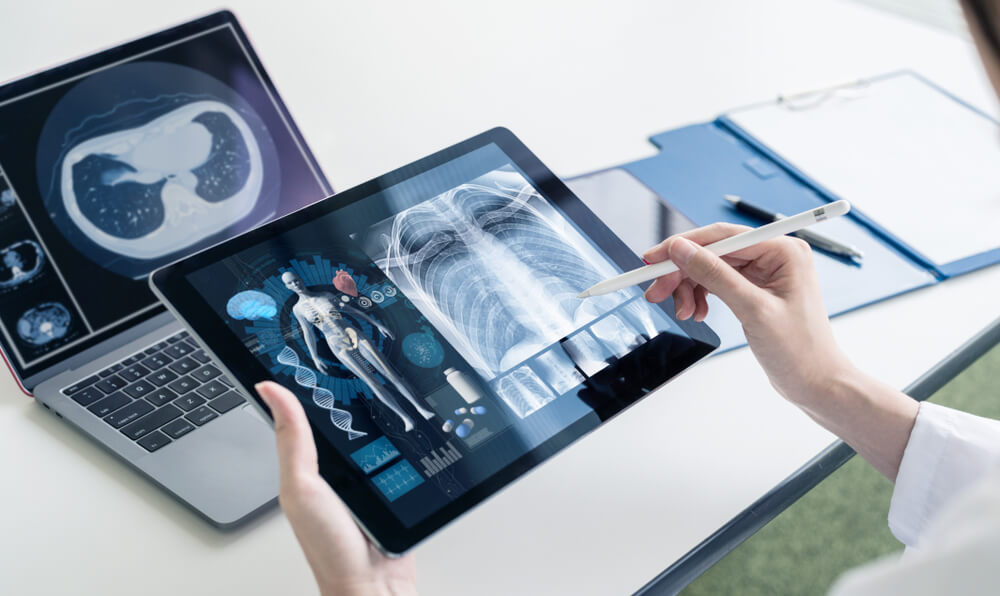How Telemedicine Has Changed the Healthcare Industry
In the last decade, technology has advanced far beyond expectations and has created opportunities for industries to improve the services and resources they provide. In the Healthcare industry, advancing imaging technology, to developing tests that analyze DNA to determine an individual’s risk factor for illnesses, continue to make progressive and positive impacts on the health care patients receive. One of the most efficient developments in medical technologies is telemedicine.
Telemedicine helps physicians connect with patients outside of the exam room in a more effective and efficient way. As the demand for appointments has increased, physicians and medical professionals have adopted innovative technology to provide patients with the same type of care they would receive in the office, all from the comfort of their home. Below, you can find more information on what telemedicine is and how it has revolutionized the healthcare industry while considering how the benefits of telemedicine can help your health care needs.
What Is Telemedicine?
Telehealth and telemedicine are often used interchangeably, despite their distinct difference. Telehealth refers to the access of a broader scope of remote healthcare services rather than receiving clinical care through telemedicine. Telehealth often involves access to services that can be conducted through email, text message, and phone calls, including appointment scheduling, and providing patient education.
Telemedicine allows physicians to provide clinical care evaluate, diagnose, and treat patients at a distance using telecommunication technology and often provides a variety of services, such as:
- Virtual office visits for patients who need online or phone visits with their health care provider to discuss medical needs, receive treatment, and perform basic diagnostics based on symptoms.
- Remote monitoring of patients, which enables individuals to utilize home health care devices that transmit data, such as blood pressure, blood sugar, and heart rate, to their physician over the internet.
- Coordinating health care such as such as sending medical and diagnostic records to other medical specialists and physicians so they can work together to treat a variety of issues cohesively and collaboratively.
The coordination of patient care is one of the most significant benefits of telemedicine. The use of telemedicine allows physicians to treat patients remotely and ensures that patients are able to receive their medical care from the comfort of their home in a timely manner.
What Are the Benefits of Telemedicine?
With telemedicine, physicians are able to review results with you, provide you with a diagnosis, and perform the same type of diagnostics they would at a regular appointment without requiring your physical presence in the office. Telemedicine was developed to provide the same advantages and benefits of in-office appointments, if not more, for patients. Many health care professionals find telemedicine helpful as it provides patients access to physicians they may not have locally. Additional benefits of telemedicine include the following:
- Accessibility. Telemedicine makes it easy to care for individuals who may not have proper transportation to medical appointments, or are practicing social distancing, as you can receive care from home. For patients who, for any reason, are homebound, telemedicine appointments allow them to communicate with medical professionals and receive the care they need without the potential risk of leaving their house.
- Affordability of healthcare. Telemedicine is now an often-covered and very affordable alternative to in-person office visits. You can always call your insurance plan for more information on telemedicine coverage. The affordability and capability of telemedicine encourages patients to continue to seek and coordinate medical care and treatment from healthcare professionals.
- Secure transmission of data. Telemedicine allows physicians to connect with patients digitally while maintaining patient privacy through HIPAA-compliant technology. It also allows for secure transmission of patient medical information if any records need to be shared to a specialist. TopLine MD affiliated providers use secure, HIPAA compliant technology to streamline patient’s coordination of care.
Telemedicine has changed and expanded the way healthcare providers are able to provide care to their patients. Physicians are able to easily communicate with their patients, and patients who have issues attending appointments, are less likely to go without medical care. Additionally, as telemedicine appointments become more affordable, it gives individuals who have financial barriers the ability to afford telemedicine visits. With the utilization of telemedicine, patients can continue to receive medical care and save costs rather than prolonging their health care needs.
Find a TopLine MD Alliance affiliated physician offering telemedicine to provide you with additional information and resources on how it can benefit your health care needs.





